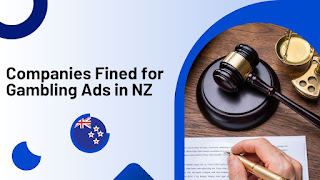Companies fined for gambling ads in NZ
February 22, 2024

The casino industry is well-developed in New Zealand: reports indicate that around 80 per cent of the country’s population engages in this risky entertainment. The local gambling infrastructure and regulations have made this pastime more accessible than ever, conditioning such high popularity.
Casinos face stiff competition, so they have to attract new customers by implementing all the available means. Gambling ads are an effective strategy, but they fall into the category of sensitive content, so NZ regulatory bodies imply multiple requirements and restrictions for operators.
Gambling Advertising Regulations and Online Casino Landscape
As already mentioned, gambling is national entertainment in New Zealand. However, players must know the legislation’s peculiarities before engaging in the activity. Brick-and-mortar casinos are allowed and regulated in the country, so risk seekers over 20 can visit several majestic establishments in Auckland, Dunedin, and Christchurch.
Everything is more complicated with online gambling since NZ-based virtual casinos are prohibited in the country. Therefore, it is illegal to operate a gaming site. However, there are no restrictions for residents on overseas platforms which are headquartered outside the country. Therefore local players can enjoy numerous CasinoDeps online casinos which are fully licensed and welcome Kiwis with bonuses.
Since entertainment is widespread in New Zealand, advertising it in the media is also allowed. However, operators face numerous requirements they must comply with. The Gambling Advertising Code is the primary document regulating this sphere and guiding casinos through all the peculiarities and rules.
All online casino ads on TV, radio, web, etc., should be conducted in compliance with social responsibility principles. Promotional campaigns must be honest and inform players of all possible outcomes.
Moreover, online casino ads need to provide more details on gambling harms to increase public awareness on this point. It’s also worth noting that advertising overseas platforms is completely illegal according to the Gambling Act 2003.
Popular Companies Fined for Promoting Gambling in New Zealand
Sometimes, companies are ready to do anything to overcome competitors and get to the top of the gambling Olympus. Therefore, some operators violate the main principles of the advertising code to promote their services to potential customers. Have a look at some loud instances when companies were fined due to their inability to comply with NZ regulations.
Entain
Entain is one of the largest international gambling and betting corporations, operating in numerous countries. The operator is constantly expanding its influence in different countries. Entain entered the NZ market and launched an advertisement through email, promoting its sports betting branch.
The company was immediately accused of violating the NZ advertisement law. It only took Entain one week of operating in the country to be fined for breaking local gambling regulations.
JackpotCity Casino
It’s another brand popular worldwide – most gamblers know its amazing service and fantastic game collection. JackpotCity entered the NZ market, which is completely legal, but then the company decided to promote itself on billboards. Such a strategy is unacceptable in the country, as such ads are not considered socially responsible and can target youngsters, who are more prone to addiction development.
Moreover, the brand was accused of misleading potential customers regarding service fees. JackpotCity billboard mentioned it’s not a gambling website promotion, while it actually led to the casino’s homepage. Such advertisement is against New Zealand legislation, so it was banned in that form.
However, the company is still allowed in the country, so 18+ players can join it, but remember to gamble responsibly.
Impact on Consumers and Society
Undeniably, the gambling sphere is well-developed in New Zealand, and many people are thrilled by the possibility of investing a couple of dollars and trying their luck in top-rated overseas casinos. While players still have the opportunity to visit brick-and-mortar establishments, they choose the convenience and accessibility of virtual platforms.
Flexible regulations and the high demand for this entertainment are beneficial for international operators, so NZ boasts a huge number of online casinos. By definition, gambling companies face stiff competition in the country and use all means to attract potential members’ attention.
Of course, users are prone to choose well-known casinos. This is why mentioning gambling sites on TV or billboards, especially by celebrities or popular TV hosts is often more effective in client engagement. Overall, advertisements in the media are a win-win situation for both operators and their clients.
However, such an approach is forbidden by the Gambling Act 2003. So, online casinos have to search for other ways to attract customers, which include providing users with brand-new games from top developers and impressive promotions for joining the platform.
On the other hand, promoting gaming sites through different means can increase the possibility of gambling-related harms. Addiction is a severe challenge that should be addressed by all institutions globally. Therefore, operators must ensure compliance with responsible gambling principles and keep underage users away from their platforms.
Final Verdict
New Zealand is another casino capital – the country’s residents are really passionate about this pastime. The local regulatory bodies implement all the available measures to minimize the possible negative consequences and create a fair and transparent gambling scene.
Banning advertisements that don’t comply with NZ regulations is a part of this strategy. Operators entering the country’s market should be aware that advertising overseas gambling is prohibited according to the Gambling Act 2003 and they should stick to requirements to provide reliable and legal services.
